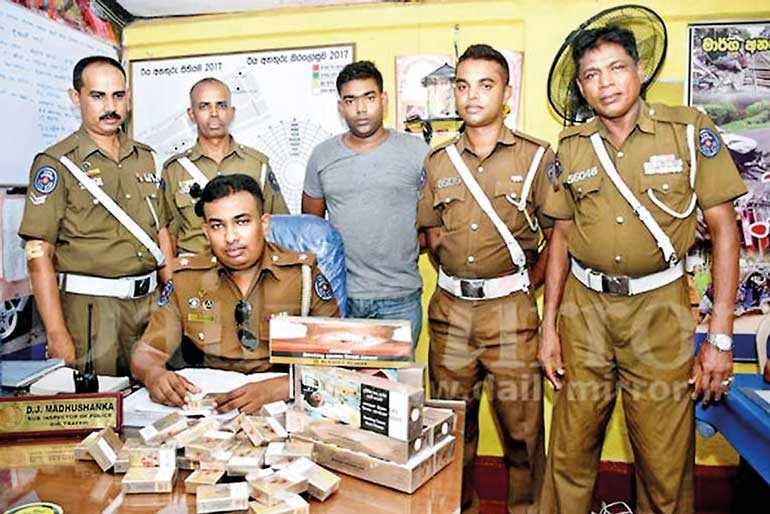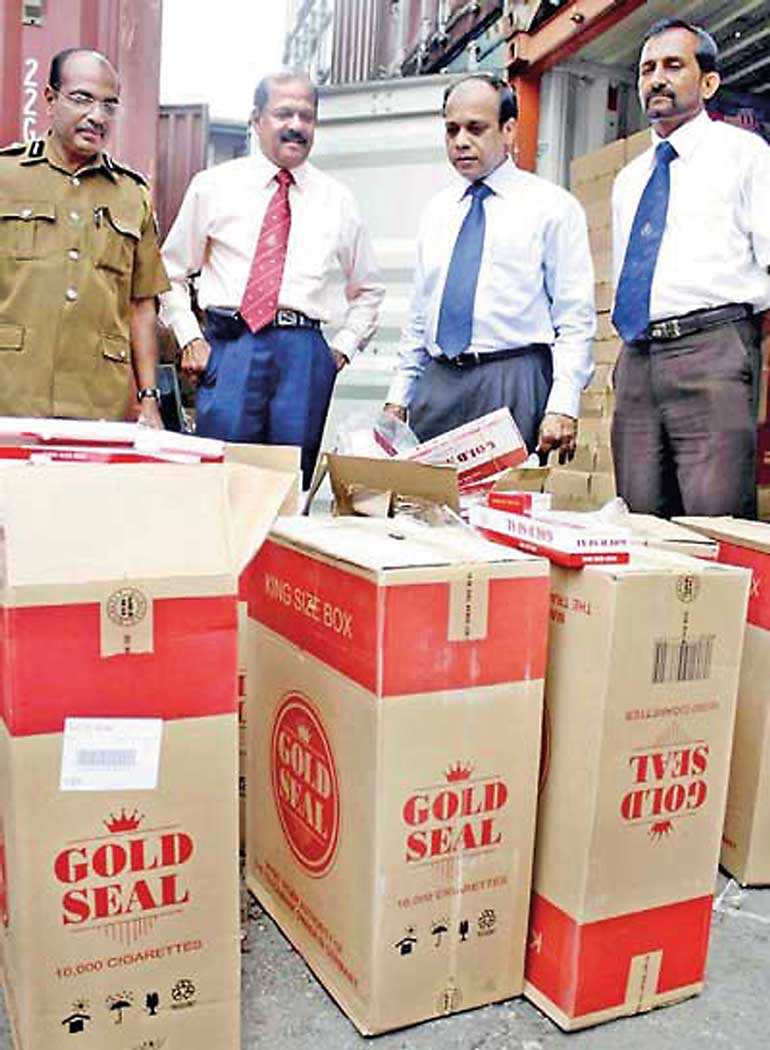Monday Feb 23, 2026
Monday Feb 23, 2026
Monday, 21 January 2019 00:00 - - {{hitsCtrl.values.hits}}


By Ajith Perera
Despite knowledge and prevalence of a wide variety of contraband items across the Sri Lankan market, there has been very little detailed examination done on their reach and presence, until now; when academics at the Open University of Sri Lanka and the University of Kelaniya ventured to study the impacts of the illicit cigarette trade on the country and its economy.
The quantification of the illicit cigarette trade is a challenging task due to its clandestine nature, but the research team has employed methodology used in a study of the illicit cigarette market in the European Union and Australia to publish a comprehensive report, which was released in Colombo last week.
The most telling blow from the illicit cigarette trade on the country is the impact on state revenues, which amounted to Rs. 18 billion in 2017. For a nation hard-pressed to generate additional revenue to fund development projects as well as public welfare, a deficit of Rs. 18 billion is significant. Based on the study, over 583 million illegal cigarettes make their way into the Sri Lankan market annually, which in addition to revenues poses a telling blow to public health and security.
The report: ‘A Baseline Study on the Illicit Cigarette Market, and the Resulting Tax Implications for Sri Lanka’, was conducted by Dr. S.N. Morais, Professor S.S. Colombage and Dr. C.N. Wickramasinghe attached to the said universities, with research carried out in the Colombo, Gampaha, Galle, Matara, Kalutara and Ampara districts, by way of test purchases, used butt collection, empty pack survey and smoker surveys. During the survey in the said areas, 15.6% of used butts had been illicit, 11% of empty packs and 28% of respondents had admitted to smoking an illegal stick over the past week. The production of illicit cigarettes is not seemingly evident within Sri Lanka, the report adds.
It states there is a broad perception that changes in cigarette taxes are inversely related to smoking rates; effectively higher taxes will lower smoking rates. However, the study finds that it “might be misleading to interpret the decline in legitimate cigarette sales as a decline in overall smoking, since consumers move to the illicit market due to higher prices”. Negative deviations of actual cigarette revenue from budgetary forecasts over the years, indicate the presence of illicit cigarettes, it adds.
High income groups gain access to such cigarettes through business establishments such as casinos, clubs, migrant communities and online networks, whilst small shops sell illicit products to trusted customers or who they perceive as genuine. The limited capacities of law enforcement agencies, regulation constraint, intelligence leaks, low penalties and corruption were identified as the primary reasons for contraband to reach our market.
That inflated price regimes lead to black markets is commonplace the world over, however Sri Lanka has painted itself into a corner on several fronts. The lure of excessive profits entices smugglers, traders and even citizens to exploit loopholes in regulations, national security and even resort to corruption. Whilst successive governments have grasped these issues and initiated remedial action, the impacts on the national economy and public finances will be long felt. The high taxes on motor vehicles and the resultant market situation fuelled by a consumption-oriented public serves ample example, and the cigarette industry has fared no better.
Cigarettes in Sri Lanka are amongst the most expensive in the world, and as a result have generated much interest amongst smuggling networks the world over, especially from the Middle Eastern, Eastern European and Asian regions. As pointed out in the university study, smuggling takes place in both large and small scales, including massive container shipments. Infrastructure facilities and human resources available to law enforcement are inadequate to monitor and detect the growing number of container traffic at the Colombo port and even via other ports of entry. Large-scale smuggling also takes place by concealing cigarettes inside other items giving rise to ‘low-volume high-frequency’ smuggling.
Ill-advised policies have led to this perverse situation, and it is policy that paves the way out. Due to challenges in marshalling an already strained system of personnel, a great deal of attention must be paid on strengthening regulations and the penalties surrounding smuggling. There is ample room for improvement in this sphere to deter repeat offenders. Sri Lanka’s archaic system of justice is laid bare alongside the outdated excise ordinance in these instances.
Persons caught for large-scale smuggling of cigarettes in containers often walk away with fines barely exceeding Rs. 120,000, which is a mere slap on the wrist in contrast to the millions in rupees of losses they would have caused the state. Another fine example was the incident in Ella last week, when excise officials nabbed the person distributing alcohol illegally to unlicensed establishments in the area – a well-organised racket which had grown over a period of time that involved bribing Government officials. However, the maximum fine on the perpetrator is a mere Rs. 120,000.
Sri Lankans are highly averse to the concept of high fines, which was evident in the howl of protests that trailed the introduction of the new traffic fine system. However, there was no corresponding public interest in improving compliance and road safety. With the system now coming into action motorists are beginning to feel the pinch, and stringent implementation is likely to produce some results. This is precisely what needs to be done with all other sectors, in particular smuggling of tobacco, alcohol and narcotics. There has to be an effective system of deterrents to dissuade offenders, and we can hope the President took note during his recent visit to the Philippines.
The report: A Baseline Study on the Illicit Cigarette Market, and the Resulting Tax Implications for Sri Lanka, is a timely publication that highlights a number of pertinent issues that go beyond just smuggling cigarettes. Whilst smuggling of drugs and illicit cigarettes have harmful health implications, smuggling of a wide variety of consumer goods have adverse implications for legitimate local manufacturing industries. Given the existing attractive incentives available from the illicit cigarette trade due to exorbitant profit margins, regulatory loopholes and easy movement of goods, regulatory frameworks and operating arms need to be further strengthened to control smuggling and trafficking. The report calls on the Government to adopt measures in line with the FCTC protocol of the World Health Organization to curb this dangerous trend.
(The writer is a retired Administration, Shipping and Maritime Security Consultant in Sri Lanka and the Middle East.)